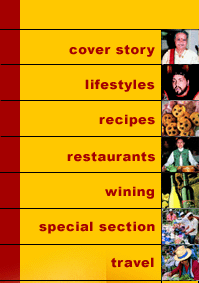
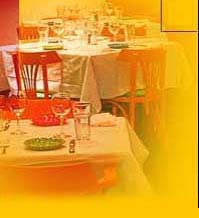

|
|
|
HURRY sundown, seems to be the prayer on the lips of the faithful as they rush along the tiny, congested bylanes of Bhendi Bazar on their way to the mosques for the evening�s prayers. Worship is de rigeur in this part of Bombay. It starts off the day in the morning and in the evening, brings it to a close. The muezzin calls from the minarets of the mosques, a sad, long wail, as the men come out in their caps, the women behind their purdahs. This is that kind of area, where everybody minds their own business. And where they come out in the evening to stand cheek-by-jowl and feast on the foods of Bohri Mohalla. Bohris, like Khojas and Memons, are the business community of Muslims. They come from Gujarat and are settled in all parts of the country, and the world. More than any other Indian Muslims, the Bohris have made inroads into trade and commerce and taken themselves to the West, to the Middle and Far East, and even deep in South-East Asia. A peaceful community of good-looking men and women, the Bohris have proved to be hearty trenchermen. They have a cuisine that is as distinct among all the other Mughlai foods as is Khoja cooking. And when they are not cooking and eating at home, the Bohris are eating out. Food vendors hoping to strike it rich in Bhendi Bazar could not have opened their stalls in a more potentially promising and lucrative area than Bohri Mohalla.
Bohri Mohalla gets taken over completely by the food stalls. Naked bulbs come on highlighting the grime, dirt, the squalor and chipped paint of the buildings, with clothes washed in the morning still hanging out to dry and children leaning out of the balconies and windows and calling to friends in the streets. Skinned and marinated chickens are strung up across stalls, ready to be fried, grilled or smoked and served sizzling hot. There are large containers of sheep�s brain, lamb liver and kidneys, goat�s meat, tongue, the spleen, udders, heart... The hungry take their pick and the vendor, who is also a cook, prepares it before them. There�s also Gurda, Kapura and Kaleji (the gizzard, spleen and heart) cooked on large tavas and served with naan. Kidney, which most Indians leave alone, is served in large slivers with an eminently edible curry. Everything costs from between Rs. 10 and Rs. 18.
There is also a chaat man selling Ragda-Pattice, Paani-Puri, Chana-Batata-Pyali for the unadventurous, very tangy, very chat-patta, very delicious, and very vegetarian. It doesn�t matter that from the same stall and on the same platform, he also sells Kheema-Pav and Gurda-Kaleji with Naan. A man has got to eat what he has to eat, and the Bohri street-eater gingerly picks his way between the meats and the savouries, moving from one food-stall to the next until his pockets are empty and his stomach full. There are big takers for the Seekh-Kebab and Shaami Kebab man. Nobody disputes his meat, the kebabs are yummy, the marinated meats wrapped around skewers or rolled into cutlets and either grilled over cracking spits or shallow-fried in oil on a tava.
Saifee Masjid, is Ghulamhusain A. Mithaiwala�s sweetmeat shop. Bohris in the area and from outside, swear by his jelebis. He makes them heavy and rich and fries them golden-yellow and crisp, to serve them dripping in saffron syrup. The shop is little more than a hole in the wall, but Ghulamhusain�s clientele doesn�t mind. Besides, they have come to stand in the street and eat the jelebis hot out of the cauldron, dripping sugary syrup. Newcomers are initiated into Bohri Mohalla with an evening doing the rounds of all the food stalls and ending at the jelebiwallah. Or a one-stop shop meal at Vallibhai Payawalla for the Bara Handi fare with Roti. And then the jelebi from across the street.
|

Home Page
About the mag
Subscribe
Advertise
Contact Us
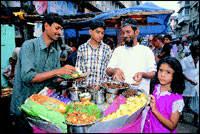 Bohri Mohalla!
Bohri Mohalla!
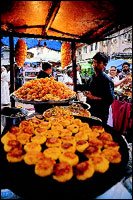 The action begins just about the time twilight descends and evening prayers are being said. Bohri Mohalla, a smallish square with cross roads, is where the Dawoodi Bohra community members stay in Bhendi Bazar. There is a reason for this little pocket of Bohris being huddled together. Their main mosque, the Saifee Masjid, is located in the vicinity, and the Bohris are a deeply religious people. If they have to stay in Bhendi Bazar, they would like to stay in the shadows of the mosque. The food vendors, quickly latching onto this philosophy, have taken their stalls in and out of the little lanes and right upto Saifee Masjid. Some of the faithful, in fact, have complained of the overpowering aroma of Bara Handi Paya and Roti wafting into the mosque from outside combined with the richly sweet (and somewhat sickly) smell of jelebis frying in hot ghee.
The action begins just about the time twilight descends and evening prayers are being said. Bohri Mohalla, a smallish square with cross roads, is where the Dawoodi Bohra community members stay in Bhendi Bazar. There is a reason for this little pocket of Bohris being huddled together. Their main mosque, the Saifee Masjid, is located in the vicinity, and the Bohris are a deeply religious people. If they have to stay in Bhendi Bazar, they would like to stay in the shadows of the mosque. The food vendors, quickly latching onto this philosophy, have taken their stalls in and out of the little lanes and right upto Saifee Masjid. Some of the faithful, in fact, have complained of the overpowering aroma of Bara Handi Paya and Roti wafting into the mosque from outside combined with the richly sweet (and somewhat sickly) smell of jelebis frying in hot ghee.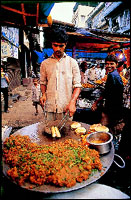 One man stands with a huge deg simmering on a sigdi of sizzling coals. From this deg, he draws out with a curved spoon generous helpings of Khichda, made of wheat, lentils and meat, pounded together and cooked over a slow fire and finally garnished with thin slices of garlic and lightly-fried onions. He is a big draw because Khichda is a dish all Muslims prepare at home, not just the Bohris. However, since it is such a tedious process to cook Khichda at home for small families, people prefer to come out to Bohri Mohalla and get their fill of the nourishing and filling food. A bowl costs only Rs. 10 and is paisa vasool! There are other extremely delicious and tantalising non-vegetarian foods cooked in the streets. Like the Baida and Mutton Rotis. A batter is spilled onto a hot plate, the roti made before your eyes, and even while it is cooking, the egg and mutton are rolled in. The baida-rotiwallah expertly flips it over in the oil, wrapping the roti with a spatula and pair of tongs. He serves the filling with an ordinary loaf of bread as well. People take parcels and go home.
One man stands with a huge deg simmering on a sigdi of sizzling coals. From this deg, he draws out with a curved spoon generous helpings of Khichda, made of wheat, lentils and meat, pounded together and cooked over a slow fire and finally garnished with thin slices of garlic and lightly-fried onions. He is a big draw because Khichda is a dish all Muslims prepare at home, not just the Bohris. However, since it is such a tedious process to cook Khichda at home for small families, people prefer to come out to Bohri Mohalla and get their fill of the nourishing and filling food. A bowl costs only Rs. 10 and is paisa vasool! There are other extremely delicious and tantalising non-vegetarian foods cooked in the streets. Like the Baida and Mutton Rotis. A batter is spilled onto a hot plate, the roti made before your eyes, and even while it is cooking, the egg and mutton are rolled in. The baida-rotiwallah expertly flips it over in the oil, wrapping the roti with a spatula and pair of tongs. He serves the filling with an ordinary loaf of bread as well. People take parcels and go home.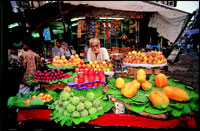 A number of sweetmeat shops flourish in the area making and serving fresh fruit mithais and barfis, the Gajjar and Doodhi Halwas most popular among them. And Aflatoon, rich and full of dried-fruits and ghee. Just off Bohri Mohalla and almost outside
A number of sweetmeat shops flourish in the area making and serving fresh fruit mithais and barfis, the Gajjar and Doodhi Halwas most popular among them. And Aflatoon, rich and full of dried-fruits and ghee. Just off Bohri Mohalla and almost outside